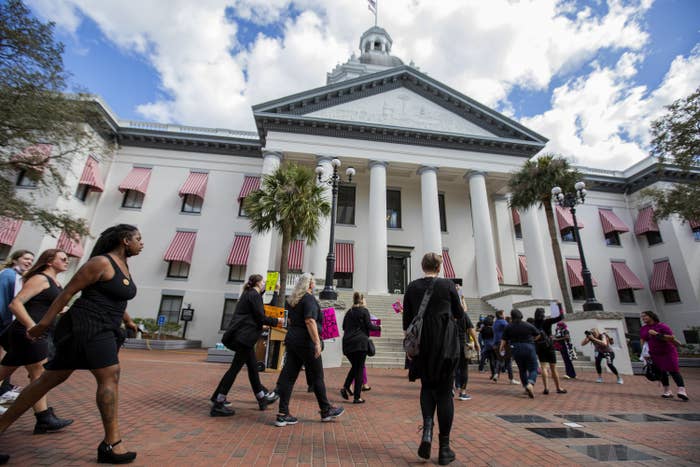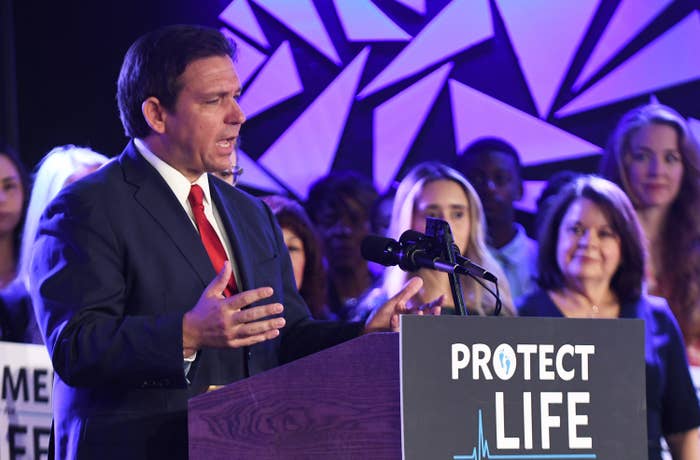
Florida Gov. Ron DeSantis has signed into law a bill that would ban most abortions in the state after six weeks, before many people know they’re pregnant, further decimating abortion access in the South.
The bill passed the Republican-controlled House of Representatives on Thursday afternoon in a 70–40 vote. DeSantis signed it into law hours later, sharing a late-night tweet with a photo of him signing the bill.
The ban does not immediately go into effect, however; medical providers and patients are still waiting for Florida’s Supreme Court to rule on a legal challenge to the state’s existing 15-week ban. If the 15-week ban is upheld, as many predict is likely due to the conservative makeup of the court, the six-week ban is then expected to take effect.
Though the proposed six-week ban has exceptions in cases of rape, incest, and human trafficking, those exceptions are only available up to 15 weeks of pregnancy. And in those cases, in order to be granted the exception, the person would have to provide documentation such as “a restraining order, a police report, medical record or other court order or documentation proving that she is obtaining the termination of pregnancy because she is a victim of rape or incest.”
In addition, there is an exception if the life of the pregnant person is at risk, but the law would require two doctors to certify in writing that the abortion is necessary to save the pregnant person's life or to avert a serious risk of irreversible physical impairment. The bill would also prohibit telehealth for abortion care.
“Many people will not even know they are pregnant by six weeks, and for those who do, it is unlikely they will be able to schedule the legally required two in-person doctor’s appointments before six weeks of pregnancy,” said Kara Gross, the legislative director and senior policy counsel at the American Civil Liberties Union of Florida, in a statement.
Since the Supreme Court overturned Roe v. Wade last June, 13 states have banned most abortions, and one state, Georgia, has a six-week abortion ban. As of April 2023, Florida is one of the last remaining states in the South that had not effectively banned abortion, according to the Guttmacher Institute. The state’s six-week ban will mean a swath of more than 780,000 square miles in the United States where people cannot access the procedure.
“It will turn Florida — a state that already requires two in-person appointments for abortion care — into one of the most restrictive states in the nation for abortion care,” said Alexandra Mandado, president and CEO of Planned Parenthood of South, East, and North Florida. “It will have devastating consequences for the southeast, Caribbean, Central and South America, and beyond.”

In recent weeks, court battles over mifepristone, one of the two drugs used in medication abortions, which is often referred to as the “abortion pill,” have taken center stage. On Wednesday, a federal appeals court ruled that the pill can remain on the market while legal cases continue, although with stringent new restrictions.
After the Florida Senate approved the proposed six-week ban last week, Florida Senate Minority Leader Lauren Book protested with pro-abortion rights demonstrators outside the state Capitol in Tallahassee. At the protest, the Democratic lawmaker was arrested with nearly a dozen others and charged with trespassing after refusing to leave the demonstration, according to the Guardian.
“With the passage of this dangerous ban, Republicans have chosen to disregard the pleas of women and the doctors entrusted with their care — including two mothers in my own district forced to the brink of death following miscarriages due to the state’s current restrictive laws,” Book said in a statement to BuzzFeed News. “Now, things will get much worse. Women have been stripped of their rights and access to life-saving health care. Women will undoubtedly die. This is not freedom.”
On top of the six-week abortion ban, the bill also allocates $25 million each year to anti-abortion pregnancy centers. Planned Parenthood has warned people seeking abortions that these centers are run by “anti-abortion activists who have a shady, harmful agenda to scare, shame, or pressure you out of getting an abortion and to tell lies about abortion, birth control, and sexual health.”
“Since they are not providing legitimate medical care, they are not bound by state and federal privacy laws,” said Laura Goodhue, the executive director of the Florida Alliance of Planned Parenthood Affiliates. “Floridians who mistakenly went to these centers when they needed help have reported being lied to about their pregnancy’s development to prevent them from getting an abortion elsewhere; being given false information about the safety of abortion and birth control; and even having relatives, partners, or employers contacted to try to intimidate them out of getting an abortion.”
Before the House voted on Thursday afternoon, Democratic representatives filed more than 50 amendments, including additional proposed exceptions as well as a proposal by state Rep. Rita Harris, which would have required the Department of Health to conduct a yearly independent financial audit of the crisis pregnancy centers receiving the $25 million. None of the amendments in the House passed.
Abortion advocates say that if the bill goes into effect, the ban would disproportionately impact people who live in rural communities, people with low incomes, people with disabilities, and people of color.
“This legislation will give the government even more power over the bodily autonomy of Floridians and everyone in the South who have long relied on the state as a safe haven for reproductive care,” said Diamond Delancey, manager of the Black Organizing Program at Planned Parenthood of South, East, and North Florida, in a statement to BuzzFeed News. “This bill would have a particularly devastating impact on Black and Brown communities, who already face barriers to accessing basic healthcare and are already nearly three times as likely to die during childbirth.”
Jamarah Amani, the executive director of the Southern Birth Justice Network, a maternal health nonprofit organization, said in a statement to BuzzFeed News that “for this ban to be passed during Black Maternal Health Week sends the message that the state of Florida does not care about the health of mothers and birthing people,” adding that the ban “undermines the essential human rights and dignity of pregnant people and their families.”
“As a Black woman who has survived a legacy of my ancestors being enslaved as property and forced to breed,” Amani said, “it is important to continue to say boldly that my body and my choices are mine — not the government’s.”
